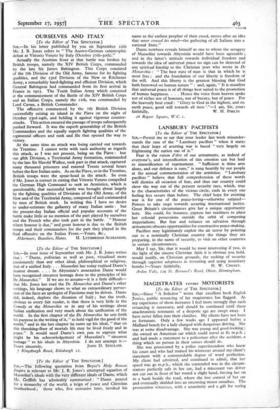[To the Editor . of THE SPECTATOR.] Sta,—In your issue of
September roth Mr. J. B. Jones writes that : " Dante, politician as well as poet, visualised more passionately than any other ideal, philosophical or religious, that of a unified Italy. . . . Mussolini has today realised Dante's dearest dream.. . In Abyssinia's annexation Dante would have recognised sincerest homage done to the principles of his De Monarchia." If we are to assume—it is a little difficult— that Mr. Jones has read the De Monarchia and Dante's other writings, his language shows to what an extraordinary perver- sion of the facts an apologist of Fascismo may be driven. Dante did, indeed, deplore the disunion of Italy ; but the truth, obvious to every fair reader, is that there is very little in the Comedy or the Monarchia or in any of his writings about Italian unification and very much about the unification of the world. In the first chapter of the. De Monarchia he sets forth his purpose in the writing of it, " to hold vigil for the good of the world," and in the last chapter he sums up his ideal, " that on this threshing-floor of mortals life may be lived freely and in peace." It would need Dante's own pen to express what might be his acknowledgement of Mussolini's " sincerest homage " to his ideals in Abyssinia. I do not attempt it.—
Yours sincerely, JOHN D. SINCLAIR. 7 Kingsburgh Road, Edinburgh 12.










































 Previous page
Previous page